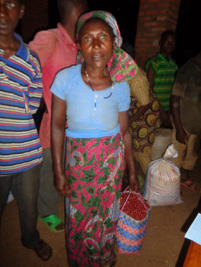Red Cherries and Farmers Who Do it Right
Keeping the quality of Rwanda coffee through support of best cherry picking practices.
By Ruth Ann Church
 It’s a busy Saturday night at the coffee washing station, high on a mountain overlooking Lake Kivu in Rwanda. Normally, the station’s three-person reception team would be yawning by 8:30pm and starting to put things away for the night, but not tonight. Word has gotten out that the National Agricultural Export and Development Board (NAEB) has lowered the floor price for coffee cherry from 270 to 240 RWF/kg and farmers know what that means. If you wait until Monday to bring your cherry to the washing station, you’ll be earning 11% less than if you get it there tonight!
It’s a busy Saturday night at the coffee washing station, high on a mountain overlooking Lake Kivu in Rwanda. Normally, the station’s three-person reception team would be yawning by 8:30pm and starting to put things away for the night, but not tonight. Word has gotten out that the National Agricultural Export and Development Board (NAEB) has lowered the floor price for coffee cherry from 270 to 240 RWF/kg and farmers know what that means. If you wait until Monday to bring your cherry to the washing station, you’ll be earning 11% less than if you get it there tonight!
The washing station normally receives 5,520 Kg cherry on a Saturday night at this time in the season, but tonight they received 7,990 Kg, a 31% boost in its business. Could this impact quality control? The temptation for farmers to pick underripe cherry must have been quite high given the impending price change. Coletha Mkasakindi [1] has walked up with her plastic-weave, handled bag full of cherry. It’s about the size of a brief case. She, like her bag, are both small compared to many of the paid transporters carrying 70 kg bulging bags of cherry, all swarming on the crowded concrete platform. Ms. Mkasakindi had delivered about the same amount of cherries the day before. So right away, one might be suspicious about the contents of her bag this evening. Did she really have more ripe cherry to harvest? Or is she bringing a bag full of underripe or otherwise defective cherry?
Turns out, Mkasakindi’s bag would again win a “super ripe red cherry” award, just like the night before. Mkasakindi smiles brightly when the reception staff admire the good work she has done and compliment her harvesting skill. However, her friend, Goreth Gasana, has arrived with a well-used, typical fibrous bag, tied with a small rope at the top as to not spill cherries during the couple of mile-walk from the farm to the cooperative. The reception staff is very disappointed to see that Ms. Gasana has brought a lot of black, overripe cherry (possibly gathered from the ground) and underripe ones which shine bright green from among the dark black ones and the only few red ones good for consumption.
“This is a shame!” the reception staff explains as Ms. Gasana is escorted to an area where she will be required to sort out the bad cherries. “These farmers are both members of the Ejo Heza womens’ cooperative. So they have been trained very well and know what to pick. And this one (he points to Mkasakindi) is consistently helping her cooperative with beautiful cherries. But a farmer to be coming at night like this, hoping that no one will notice the bad cherry is just cheating!” he exclaims in a calm-but-scolding manner.
This vignette is played out over and over across all of Rwanda’s washing stations. One farmer brings a bag full of well picked cherry, the next one has only 75% well-picked, and 25% black, underriped, stems and other debris. Sadly, in too many cases they are paid the same. The farmer “doing the right thing” is essentially cheated, because her cherry is immediately mixed with that of the farmers bringing a low quality mix. The price the cooperative (or private washing station) receives in the end is therefore “diluted” by the degraded quality of the raw material.
With the support from the Feed the Future Innovation Lab for Food Security Policy, the Africa Great Lakes Coffee Support Program (AGLC) offered support to the National Agricultural Export and Development Board (NAEB) in the form of data and research to help change policies and prevent this kind of “cheating,” at the expense of farmers who do it right. At a roundtable on the NAEB campus in Kigali in June 2017, the research team presented options to 25 participants representing a broad cross-section of the Rwandan coffee industry, including a minister from parliament, NAEB officials, large exporters, small private producers, and cooperatives. One outcome of that session was the idea to promote more formally the practice of floating cherry in water before weighing what the farmer has brought. Many defective coffee cherries are lighter than the good, dense and moist ones. Floatation to sort cherries is used regularly at many washing stations in other countries, and even in Rwanda when companies prepare for important quality competitions.
Through facilitation by the AGLC team, and follow-up with a policy brief [2], the government is now taking steps to revise its coffee floor price policy. It aims to reward higher quality cherry by encouraging practices such as “floatation,” as well as visual sorting standards. Stay tuned for next season, 2018, when Ms. Mkasakindi and Ms. Gasana will hopefully both be arriving at the washing station with excellent quality cherry, and receiving high prices for their effort.
[1] Characters’ names have been changed to keep confidentiality.
[2] FSP AGLC Team. 2017. Pricing Coffee Cherry to Incentivize Farmers and Improve Quality. Feed the Future Innovation Lab for Food Security Policy Research Brief 43. East Lansing: Michigan State University



 Print
Print Email
Email